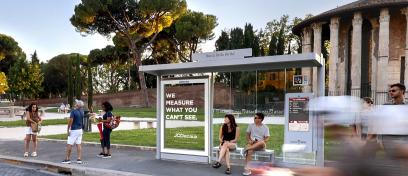Brand Urbanism®: a new role for brands in the public urban space
- Paris
For its 25th birthday, UTOPIES has launched 25 collaborative initiatives with businesses and NGOs seeking to open new paths for commitment and impact. One of these initiatives, led with JCDecaux, explores Brand Urbanism® with a view to understanding the way in which brands express themselves in the urban space and the accompanying investments. This study analyses the new role of brands in the city, focusing on their raison d’être, local roots and demonstrating by example, through creative positive impact initiatives.
A study by UTOPIES in partnership with JCDecaux
What is Brand Urbanism®?
From advertising and guerrilla marketing to, for example, the rise of sponsorship in sports stadiums in France, the presence of brands in public spaces is nothing new. What is new, however, are the strong expectations consumer-citizens have of brands. They want brands to commit to the common good and to play a useful role, consistent with their core values. These new expectations call for brands to fully take ownership of their influence on consumers' lifestyles and proactively contribute to improving the quality of life in cities, while at the same time cultivating local presence and awareness. Brand Urbanism® is a response to these expectations, an emerging practice that for brands consists of forming partnerships with cities to launch and/or finance temporary or permanent urban development projects, devoting a fraction of their marketing budgets to improve city dwellers' quality of life.
Brand Urbanism®: a natural playing field for UTOPIES, part of the DNA of JCDecaux
To explore the success factors and legitimacy conditions involved in this approach. UTOPIES reviewed 50 cases of Brand Urbanism® worldwide and conducted 15 interviews to develop a set of guidelines that can be used to promote the concept in its ideal form. UTOPIES, a consultancy and think tank specialised in sustainable development, joined forces with JCDecaux to carry out the study.
3 key stakeholders central to the rise of Brand Urbanism®
- Cities, home to sustainable development challenges and solutions alike, are the pivotal stakeholders in Brand Urbanism®. To meet the needs of growing urban populations (in terms of food, mobility, well-being, etc.) against a backdrop of ecological transition and diminishing public budgets, they must unlock synergies between public and private players on a local basis. To be more than a simple geographical space, cities are seeking to form new bonds with city dwellers and need to stand out to attract capital, business and tourism.
- Citizens, in their role as consumers, have growing expectations concerning brands' responsibility and social engagement. They show greater appreciation for local brands, which more closely correspond to their needs. They also expect high-quality services from their cities.
- Brands, for whom acting locally is in their best interest, the aim being to form closer relationships with their customers, demonstrate their social usefulness and embody their core values on a daily basis. They have the resources but also the duty to do so, given their influence on consumers' lifestyles and behaviour.
“By offering cities the opportunity to finance a public service via advertising, Jean-Claude Decaux understood as early as 1964 the positive aspect of the relationship started by our Group between local authorities and brands. Half a century later, JCDecaux is more convinced than ever of the relevance and strength of this synergy. Our business model, in which Brand Urbanism plays a natural part, stands as a vector of positive transformation benefiting cities and brands.” says Isabelle Schlumberger, Executive Vice President, Sales, Marketing and Development, at JCDecaux in France.
Four golden rules for committed Brand Urbanism®
According to the study, the success of Brand Urbanism® projects depends on four key factors that are as complementary as they are indispensable:
- The collective interest – A visible and recognised contribution to local capital (social, cultural and environmental) and the resilience of the city, a real-life response to expressed or observed social and environmental needs;
- A meaningful story – In-depth prior analysis of needs, the choice of a meaningful site, consistency between the project, the commitments and the core values of the brand;
- Participation and durability – Consultation or even co-creation with residents on the design, implementation, maintenance and assessment of the project; impact assessment and monitoring, mediation by a trusted third-party expert;
- Transparency and honesty – Open communication, public presentation of the terms and objectives of the partnership, traceability of funding, and a policy of continuous improvement.
“In our opinion, Brand Urbanism® opens interesting paths to help cities succeed in overcoming the incredible challenges facing them, including those related to the environment, the climate, social links, and the renovation of abandoned districts. Their ability to resolve these issues hinges on the commitment of all players, including those in the private sector. It also helps brands to establish stronger local roots in the areas where they do business and where their customers live, and to assert their social usefulness.” says Élisabeth Laville, Founder and Chair of UTOPIES.
An overview of Brand Urbanism® initiatives
From rethinking urban mobility and promoting widespread access to sport, to re-enchanting urban spaces and helping to resolve environmental problems, Brand Urbanism® is taking on several forms in numerous sectors in response to an array of issues.
- Court Duperré – Nike – Paris, France: renovation and creation of a colourful basketball court by Nike;
- Let’s Colour – Dulux: programmes on painting common areas in disadvantaged districts around the world, by residents and the brand’s employees;
- Night Bus – De Koninck – Ghent, Belgium: introduction of a night bus service financed by the beer brand for safer trips home;
- #Engie Harmony Project Solar Graffiti – Engie X Heliatek – Mexico City, Mexico: refurbishment, maintenance and lighting of sports grounds securing the areas and once again giving them with a key role in neighbourhoods;
- Domino’s Pizza: contribution to the renovation of roads in numerous towns in the United States, to ensure the delivery of pizzas in good condition and maintain customer satisfaction.
Methodology:
Study conducted from January to June 2019
A series of interviews carried out by UTOPIES and the analysis of some 50 case studies by Brand Urbanism® experts including Gilbert Rochecouste (a pioneer in placemaking and a UTOPIES partner expert), Rinske Brand (founder of an agency specialised in Brand Urbanism in the Netherlands), Lisa Sibbing (author of a thesis on the topic), Thomas Kolster (a pioneer in, and theoretician of, “Goodvertising”, to which Brand Urbanism is related) and Raphaël Souchier (founder of VIBE, specialised in local presence, and a UTOPIES partner expert).
About UTOPIES
Founded 25 years ago by Élisabeth Laville, UTOPIES is the leading independent agency and think tank in France providing support for businesses and brands which make sustainable development the key focus of their strategies. It also ranks among the world’s top agencies in the field. With some 50 consultants, UTOPIES works to open new paths by encouraging companies to integrate social and environmental challenges into their mission, strategy and innovation policy. The agency is particularly recognised for its work on brand strategies and positive innovation, as well as for its expertise in socio-economic and local economy impact studies. Putting Into action what it recommends to its clients, UTOPIES topped the 2019 Great Place to Work rankings in the “Company with under 50 employees” category. The agency was the first to obtain B Corp certification in France, in 2014, and is also responsible for developing the international certification for engaged companies in France. The UTOPIES team is based in Paris, the location of its long-standing headquarters, and has offices in Bordeaux and Annecy and, for several years now, in Sao Paulo and Mauritius.
www.utopies.com
About JCDecaux
JCDecaux, the number one outdoor advertising company worldwide, is present in more than 80 countries and 4,030 cities with over 10,000 inhabitants. For more than 55 years, JCDecaux products have been the benchmark in innovation, quality, aesthetics and functionality. Thanks to the expertise of its employees, the Group's service offering, particularly on upkeep and maintenance are recognised by cities, airport and transport authorities, along with advertisers around the world. JCDecaux is currently the only world-class player to focus exclusively on outdoor advertising and the development of all related activities: street furniture, transport and billboard advertising. In the age of the smart city, JCDecaux is positioning itself as a major player and is already playing a vital role in building the connected city, a city that is more human, more open and more sustainable.
Find out more: www.jcdecaux.com
Follow us on Twitter, LinkedIn, Facebook, Instagram et YouTube
Press contacts
LookSharp for UTOPIES
Lorella Contardo - lorella.contardo@looksharp.fr - +33 (0)1 81 80 95 12
Léa Petit - lea.petit@looksharp.fr - +33 (0)1 81 80 95 14
JCDecaux
Estelle Ardouin - estelle.ardouin@jcdecaux.com - +33 (0)1 30 79 34 48

